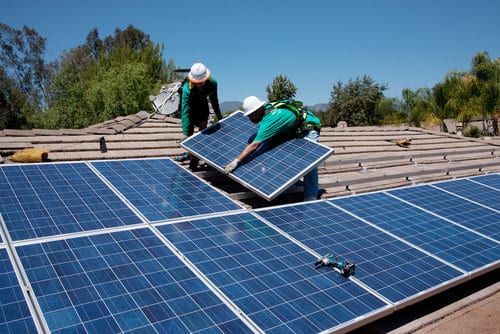
While utilities across the U.S. are seeking to impose higher fixed charges and dismantle net metering, they usually don’t get all they ask for.
Utilities across the United States are stepping up efforts to dismantle retail-rate net metering and impose charges that undermine the economics of customer-installed solar, according to a new report.
NC Clean Energy Technology Center and Meister Consultants’ latest annual 50 States of Solar report finds that state policies are experiencing “considerable uncertainty and volatility” due to these utility-led initiatives.
“This report demonstrates that critically important state policies like net metering are experiencing unprecedented uncertainty, as many states considered drastic policy changes in 2015,” notes NC Clean Energy Technology Analyst Benjamin Inskeep, who co-authored 50 States.
According to the report, 27 states considered or enacted changes to net metering in 2015, with changes to net metering approved in 28 utility service areas in 17 states. Meanwhile, proposals by 35 utilities to increase fixed charges on residential customers were pending or decided.
Utilities have typically sought to shift compensation to wholesale rates for surplus generation from customer-owned solar, a policy which the report describes as “net billing”. But while Hawaii and Nevada became the first two states to shift their policies from net metering to net billing, utilities are not winning every battle.
California has passed a successor policy which preserves the basic features of retail-rate net metering while adding “non-bypassable” charges in the 2-3 cent per kilowatt-hour range, and Colorado and Iowa decided to retain their net metering policies.
The most frequent policy move by utilities to impose changes that impact the economics of customer-owned solar was to attempt to impose higher fixed charges.
61 utilities in 30 states proposed increasing fixed charges on all residential customers, which the report found “can significantly reduce the financial value of going solar”. Another 21 utilities in 13 states proposed extra charges or fees on solar or all forms of distributed generation.
Here again, utilities are not getting everything they want. The report finds that “few” of the solar-specific charges which were proposed were approved by regulators. And despite a particularly intense push for increases in fixed charges in the fourth quarter of the year, “approved increases in the quarter were considerably below the requested amount”.
While solar advocates typically see these changes in the context of a conflict, there is a intellectually valid question as to what the value of solar is on the grid. 50 States found that a number of states including New York, Arizona and Utah have opened proceedings to study the value of solar, which will influence future net metering policy developments and successor programs.
Source: PV Magazine. Reproduced with permission.








